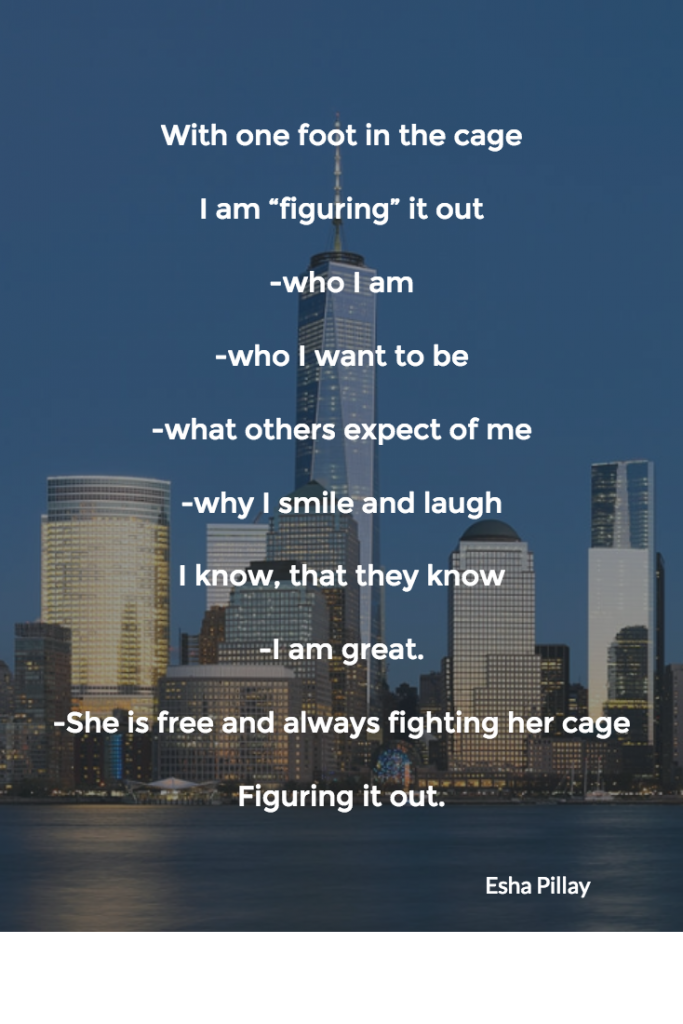
Esha Pillay argues that she has been taught to follow unnatural standards of professionalism within office culture (a.k.a white culture).
I wrote this poem when I was in New York City and a man was collecting anonymous stories. At the time I thought it was just how I was feeling at that moment. It was only afterwards that I realised it wasn’t only that moment: these feelings of being caught are a constant battle.
As a young woman of colour who has recently entered the “professional” workplace, daily microagressions and continuous invisibility are already becoming tiring.
In my experience, being professional means wearing a suit and tie and not a shalwar kameez. It means wearing your hair in a controllable style and not natural. It means using proper grammar and not letting your wild tongue run. It means being respectful, even when you are disrespected. It means meeting deadlines because there is a deep sense of urgency. It means not “being so emotional”, because emotions are not valid or right.
It’s about separating the professional from the personal because the work that you are producing doesn’t essentially belong to you. It belongs to them. It means being on time because that shows you care. Putting your thoughts, energy, creativity, time, and care into your work doesn’t show that you actually care. Perfection shows that you care.
Office culture is undoubtedly a by-product of structural and cultural racism. People like me are taught to follow and fit in with standards of professionalism within office culture (a.k.a white culture) because that is the norm. The same racist patterns that we see play out in the classroom, beauty magazines, movies, sports, and the streets are also living in our work spaces.
Hierarchy is key. Authority is crucial. There is only one way of doing things. One model. One type of knowledge. Following orders is how you will make it. You might not be breathing by the end of it but that’s how you get through it. Power is at play because you are disposable and your skills transferrable. You can be replaced – very quickly.
I sometimes wondered how other non-white folks fit in better with office culture and get along so well with their white colleagues. Then I realised the more you are accommodating of white office culture and don’t challenge white norms, language, and ideas you become the good person of colour. The safe person of colour. The person of colour who they feel comfortable with.
So comfortable that you learn microagressions are just part of the job description. You let racial jokes slide because then you are not a threat. You smile at white (and white upper-class) cultural references because then you will be perceived as friendly and somewhat interested. You don’t share your opinions at meetings because you might not be smart enough for their white-centric approval.
This is all exhausting and it’s not even the preface of my story. These battles at work don’t end once you leave the office. They follow you after you leave the building, get on the train, and walk to your home. They flow through your mind and replay. Over and over again. You feel the self-worth flow down the drain as you get ready in the morning to go back into it again.
I am someone who critically thinks about the ways in which colonialism, racism, and oppressive systems kick us down and eat at our minds and bodies. How we hide how the things attached to us consume us along the way. For people of colour breaking down the walls of oppression also means resisting the chains we don’t mind holding on to.
The people who don’t see us. The words that enter quickly but slowly sink in deep within our walls. The cycles we are too afraid to break because we just might spin out of control. We want to be careful because so much is at stake. Our financial security, mental stability, and family responsibility.
Whether we hold on because of familiarity, comfort, or safety, essentially it suppresses us.
Acknowledge it. It’s real. Once we realise that we too can break, gathering the pieces to build back up won’t be so bad. All it took were for those words to be said out loud. To know that you will break but that you will get back up. You will get back up. You will get back up.










